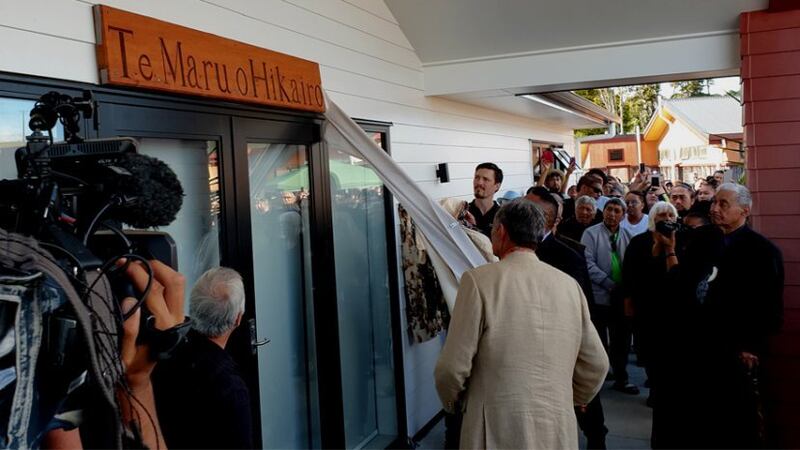A new wharekai has been opened by King Tuheitia Pōtatau Te Wherowhero Vll at Waipapa Marae in a tā i te kawa ceremony lead by the Kīngitanga on Tuesday.
The building was named 'Te Maru o Hikairo' by the King’s eldest son, Whatumoana Paki and will seat 250 guests with a state-of-the-art kitchen all costing nearly $1.2 mil.
Features include a glass window panels facing the harbour to capture the view and physically link the wharekai to the Kawhia moana, in order to meet the wishes of the late Māori Queen, Te Arikinui Dame Te Atairangikaahu, who wanted a ‘room with a view’ of the Kawhia Harbour.
The new wharekai is expected to feed twice as many people as the previous building in one sitting, with half of the number of kitchen workers required to help feed guests during events such as poukai each year.
Marae trust chairperson Meto Hopa says, “We are very privileged to have a new wharekai. We couldn’t have achieved this without our major funders, the Department of Internal Affairs, Te Puni Kōkiri, Trust Waikato and Waikato - Tainui. There are also many iwi families who have made financial contributions as well, our marae is blessed.”
Māori Development Minister, Nanaia Mahuta congratulated Waipapa Marae on the opening of its new wharekai.
“I want to acknowledge Waipapa Marae for their vision, hard work and dedication to build a wharekai that meets the needs of the people. It’s a true testament to their commitment to the manaaki, the people who visit each year,” said Mahuta.
“Ngāti Hikairo opened their new kāuta (kitchen) ahead of the formal opening of their wharekai (dining hall) today. This is a fitting tribute to the late Koro Wetere as Waipapa was his whānau marae.”
In addition to repairing whare and capital works, Oranga Marae can support marae whānau to learn about tikanga and kawa or upskill in traditional practices, such as whaikōrero or karanga.
“Oranga Marae invests in both the physical development as well as the cultural revitalisation of the marae with people being at the very heart,” said Mahuta.

